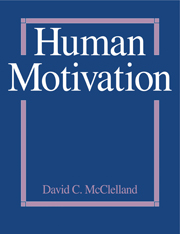Book contents
- Frontmatter
- Preface
- Foreword
- Contents
- Part 1 Background
- Part 2 The Nature of Human Motives
- Part 3 Important Motive Systems
- Part 4 Contextual Effects on Human Motives
- 11 Motivational Trends in Society
- 12 Cognitive Effects on Motivation
- 13 How Motives Interact with Values and Skills to Determine What People Do
- 14 Motivation Training
- 15 Milestones in the Progress Toward a Scientific Understanding of Human Motivation
- Bibliography
- Acknowledgments
- Index
11 - Motivational Trends in Society
Published online by Cambridge University Press: 05 July 2014
- Frontmatter
- Preface
- Foreword
- Contents
- Part 1 Background
- Part 2 The Nature of Human Motives
- Part 3 Important Motive Systems
- Part 4 Contextual Effects on Human Motives
- 11 Motivational Trends in Society
- 12 Cognitive Effects on Motivation
- 13 How Motives Interact with Values and Skills to Determine What People Do
- 14 Motivation Training
- 15 Milestones in the Progress Toward a Scientific Understanding of Human Motivation
- Bibliography
- Acknowledgments
- Index
Summary
• ANALYZING THE REASONS FOR THE GROWTH AND DECLINE OF CIVILIZATIONS
Cultures, like individuals, differ greatly not only from each other, but from themselves at different moments in time. Some are peaceful, others aggressive; some rich, some poor; some expansive and mobile, others stay-at-home. Anthropologists, historians, economists, political scientists, and philosophers have often tried to figure out why. Why were the Romans such geniuses at military and civic organization, and the Greeks not? Why were the Greeks so successful economically for some hundreds of years before Christ only to disappear for a time as a nation of importance in world history? Why did the Roman Empire rise and fall? When a second flowering of civilization occurred on the Italian peninsula during the Renaissance, why was it in the arts rather than in military science, as at a much earlier period? What caused the British Empire to expand over the entire face of the globe in the nineteenth Century and to decline almost equally rapidly in the twentieth? Why were the British more successful than any other European nation?
Answers by historians to such questions tend to be given in terms of particular events in history, such as a battle that was won or lost, suddenly favorable terms of trade, or the discovery of a new economic resource to exploit.
- Type
- Chapter
- Information
- Human Motivation , pp. 415 - 472Publisher: Cambridge University PressPrint publication year: 1988



